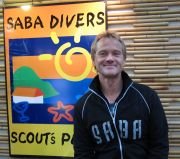Saba Business Association chairman and newly elected board member of the Saba and St. Eustatius Chamber of Commerce Wolfgang Tooten decried the attempt to strip all non-Dutch residents of their voting right in the local Island Council elections. This writes The Daily Herald.

The alleged dilemma posed by Dutch Minister of Home Affairs and Kingdom Relations Ronald Plasterk concerns non-Dutch citizens having theoretically some influence on national politics. This strikes local businessmen as gratuitous, scapegoat demagoguery. “It is rather ridiculous to argue that non-Dutch must be blocked from voting because they could have a 0.00001 per cent chance to ‘influence’ the election of at best one First Chamber member.”They do not see what strategic national interests may be impacted by such a remote theoretical prospect. The polarising rhetoric about this serves only to vilify the non-Dutch strawman and it recently rippled into the baseless remarks from Dutch Parliament Second Chamber member Van Raak of the Socialist Party.
In an article published by The Daily Herald on November 27, Van Raak is quoted as saying that “more and more people are living below the poverty line on the islands, while the rich foreigners are getting richer and increasingly profit.” Tooten finds it interesting that the responsibility for the national governing cabinet’s transitional missteps and the resulting frustrations of the local population is so swiftly shifted on some far-away outsiders. He also notes that these statements come on the footsteps of the Royal Couple’s visit to Saba, and the celebratory welcome of the King and Queen by a parade of flags representing the many resident nationalities at the heart of this community.
Tooten asks “who does it serve to alienate the many non-Dutch citizens of the BES [Bonaire, St. Eustatius and Saba] islands from their representatives by denying them the right to vote in local elections?” The suspicion is that some in the Dutch political elite calculate the low-cost benefits of catering to electoral xenophobia. “Who needs non-Dutch investors, a friendly business environment and local development when the islands are to be run in neo-colonial fashion through Dutch taxpayer subsidies?”
There is virtually no political cost to heavily taxing Caribbean investors while denying them local representation. The perception is also that it only serves to appease the interests of certain entrenched old-school politicians making this a “win-win” for ministers seeking to gag criticism. He states that “the non- Dutch electorate, many of whom have settled for many decades on the islands, have been the driving force promoting local transparency and accountability from civil servants.”
In veiled words Tooten says “independent voters and thinkers can make a difference in the behaviour of politicians.” Electoral diversity fosters small steps away from kinship politics towards progressive electoral platforms benefiting all. “All residents must be part of the crucial process of constitutional changes and their evaluation,” Tooten argues. “Many business owners of the BES islands are non-Dutch and contribute daily to the economy, create jobs and pay taxes,” he adds. Hastily denying voting rights to a loyal, tax-paying segment of the population may lamentably backfire, warns Tooten.
 Archive of posts from Saba-News.com Archive Saba News
Archive of posts from Saba-News.com Archive Saba News
I think the point Van Raak was trying to make is that many foreign-owned business on small islands like Statia and Saba, especially the hotel and scuba industry, get the large majority of their profits from tourists rather than from locals. Charging up to $100 for a hotel room per night and $80-$100 for a day of scuba diving, along with buying tourist kitch brings a lot of USD and Euros into the hands of foreign business owners. The owners are doing quite well financially, but this isn’t being reflected on the local/foreign employee wages, which forces many locals/foreign residents to work 2-3 jobs just to be able to get by. Rather, the money is there, it just isn’t being fairly redistributed into the local economy.
Sure, surely Saban, the foreigners on Saba all get super richer and the rest suffers. That’s the way to descript it if you have nor clue about the facts. In general we are all in the same boat and we should work together to get on save ground. This blame game only helps the Dutch politicians not to do what they have promised to do. We as a community should stand strong together. You think, we: the bad business people make to much money, be my guest and walk awhile in my shoes and you’ll see that not all what you expect is what you think it is.